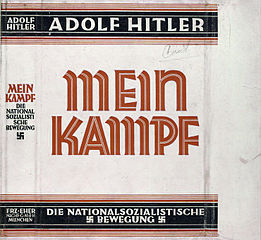
Dust jacket of 1926–1927 edition
Adolf Hitler’s Mein Kampf has quietly become an e-book bestseller, climbing high on the charts of political books on Apple’s iTunes and Amazon’s Kindle, even as print sales of the 1925 anti-Semitic screed continue to languish.
“Mein Kampf hasn’t made the New York Times‘ nonfiction chart since its U.S. release in 1939, the same year Germany invaded Poland, and its print sales have fallen steadily ever since,” Chris Faraone wrote for the website Vocativ. “But with a flood of new e-book editions, Hitler’s notorious memoir just clocked a banner digital year.”
Two different digital versions of Mein Kampf currently rank third and fourth on the Politics & Current Events on iBooks, outpacing books by modern-day conservative pundits and celebrities such as Sarah Palin, Charles Krauthammer and Glenn Beck. The books sell for 99 cents and $2.99 respectively.
On Amazon, the Kindle version of Mein Kampf ranks No. 1 in the category of Propaganda and Political Philosophy.
Odd how the LA Times‘ instinct is to compare the sales of Mein Kampf with books by American conservatives, rather than works by, say, Marx, Mao, or Mussolini. You know, comparable theorists of totalitarian power (oh, wait…that is how the Times views Palin, Krauthammer, and Beck).
In a post from 2010, Reason TV looks at the power of Nazi Propaganda:
From radio and film to newspapers and publishing, the Nazi regime controlled every aspect of German culture from 1933-1945. Through Josef Goebbels’ Ministry of Public Enlightenment and Propaganda, the German state tightly controlled political messaging, promoting deification of the leader—the Führerprinzip—and the demonization of the ubiquitous and duplicitious “racial enemy.” A new exhibit at the United States Holocaust Memorial Museum in Washington, D.C., examines “how the Nazi Party used modern techniques as well as new technologies and carefully crafted messages to sway millions with its vision for a new Germany.” Reason.tv’s Michael C. Moynihan visited with museum historian and curator Steve Luckert to discuss the role and effectiveness of propaganda in the rise of fascism and what lessons can be drawn from the Nazi experiment in mass manipulation.



